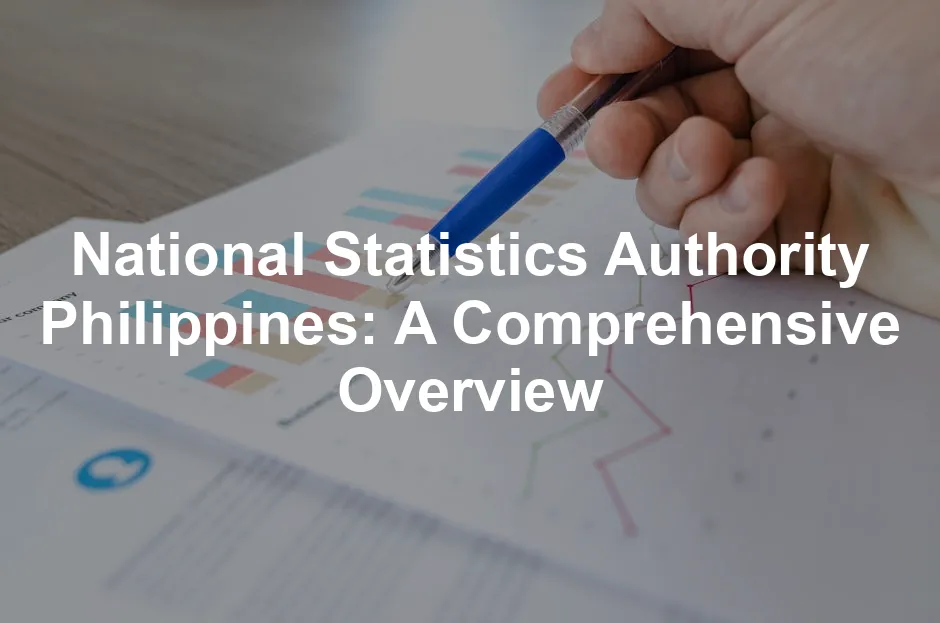Introduction
The Philippine Statistics Authority (PSA) is the country’s primary data authority. Established in 2013, it emerged from the merger of four key statistical offices: the National Statistics Office (NSO), the National Statistical Coordination Board, the Bureau of Agricultural Statistics, and the Bureau of Labor and Employment Statistics. This consolidation was no mere paperwork shuffle; it was a strategic move to streamline data collection and enhance civil registration services.
Accurate statistics are vital for effective policy-making and socio-economic development. Think of statistics as the GPS for governance, guiding leaders through the twists and turns of public needs. Without reliable data, navigating the complex landscape of societal issues becomes akin to sailing a ship without a compass — risky and often misguided. Equip yourself with Statistical Analysis Software to ensure you’re steering in the right direction!
The PSA’s role extends beyond mere number crunching. It is a cornerstone for various sectors, from economic planning to health and education. With its finger on the pulse of the nation, the PSA ensures that data is not just collected, but transformed into actionable insights. This helps in crafting informed policies that can make a real difference in the lives of Filipinos.
Moreover, the PSA’s commitment to transparency and accessibility means that citizens can benefit from the data collected. Whether it’s understanding demographic shifts or tracking economic indicators, the PSA provides a treasure trove of information. This blog post will unfold the historical backdrop of the PSA, showcasing its evolution and significance in the Philippines.

For a deeper understanding of the PSA, you can read more in our article philippine statistics authority.
Historical Background of the Philippine Statistics Authority
Formation and Evolution
The PSA was born out of a necessity for a more coherent statistical framework in the Philippines. Before the merger in 2013, the country had multiple agencies handling statistics, each operating in silos. This fragmentation led to inefficiencies and inconsistencies in data collection. Recognizing these challenges, the government enacted the Philippine Statistical Act, paving the way for a centralized authority.
This formation wasn’t just about combining offices; it was about creating a more robust system for data governance. By consolidating resources, the PSA aimed to enhance the quality, timeliness, and accuracy of national statistics. Imagine trying to bake a cake with several cooks in different kitchens. The end result might be a culinary disaster! The PSA’s creation was like opening a single, well-organized bakery where everyone follows the same recipe.
The expected benefits of this merger included improved efficiency in data processing and a unified approach to statistical reporting. With all statistical functions under one roof, the PSA could streamline operations, reduce redundancy, and ultimately provide more reliable data to policymakers and the public alike. If you want to dive deeper into data management, consider grabbing a copy of The Data Warehouse Toolkit: The Definitive Guide to Dimensional Modeling.
In its early years, the PSA focused on integrating its various functions and establishing a solid data collection framework. It initiated major surveys, including the Population and Housing Census, which provided essential socio-economic data. This was a crucial step in understanding the dynamics of the Filipino populace.
As the years progressed, the PSA embarked on significant milestones, such as the implementation of the National Identification System (PhilSys). This initiative aims to create a unified identification framework for all Filipinos, enhancing data governance and security. The PhilSys is expected to revolutionize how citizens interact with government services, making access to vital records and services more straightforward and efficient.
In summary, the formation of the PSA marked a transformative period in the Philippines’ approach to data management. It laid the foundation for a more organized, efficient, and transparent statistical system, better equipped to meet the evolving needs of society. The PSA continues to build on this legacy, adapting to new challenges and embracing innovative practices to fulfill its mission.

Functions and Responsibilities of the PSA
Data Collection and Management
The Philippine Statistics Authority (PSA) plays a crucial role in gathering national data through censuses and surveys. This includes the Population and Housing Census and the Labor Force Survey. These extensive efforts help paint a comprehensive picture of the country’s demographics and economic conditions.
The Population and Housing Census occurs every ten years. It collects vital information about population size, distribution, and housing characteristics. This data aids in effective resource allocation and urban planning. Without it, understanding where people live and their living conditions would be like trying to find your way in a dark room – impossible! To get a grasp on data visualization, check out Data Visualization Tools that can make your data stories come alive!
Next, we have the Labor Force Survey, which runs quarterly. This survey gathers data on employment, unemployment, and underemployment in the country. It helps policymakers shape labor policies and programs. Imagine trying to run a marathon without knowing how many runners are on the track – that’s how critical this data is for economic planning.
The PSA collects various types of data, including economic, demographic, and social statistics. Economic data encompasses everything from inflation rates to household income. Demographic data includes age, sex, and education levels. Social statistics touch on health, education, and living conditions. Each piece of data is a vital cog in the machine of national planning. The insights drawn from this data guide government policies, ensuring they align with the needs of the population.
Moreover, the significance of this data can’t be overstated. It informs decisions on infrastructure projects, social services, and economic initiatives. For instance, understanding poverty rates helps the government develop targeted programs to assist low-income families. Without accurate data, these programs would lack direction, much like a ship without a rudder. If you want to understand the intricacies of statistical methods, consider Statistical Methods for the Social Sciences.

Civil Registration
The PSA is also the go-to agency for civil registration services. It issues essential documents, including birth, marriage, and death certificates. These documents are critical for various legal and administrative purposes. Need to enroll your child in school? You’ll need a birth certificate. Planning to get married? You guessed it – a marriage certificate is a must.
Obtaining these vital documents has become easier with the PSA’s online services. Individuals can request certificates online, making the process more accessible for everyone. This is especially beneficial for overseas Filipinos who need these documents for legal purposes back home. It’s like having a magic portal that connects you to essential records without the hassle of long queues!
To request a civil registry document, individuals can either apply in person or online. For in-person applications, valid government-issued IDs are necessary. The online portal, known as PSA Serbilis, allows users to submit requests from anywhere, making it a popular choice.
The PSA ensures that civil registration is not just about collecting data; it’s about empowering citizens. By facilitating easy access to vital documents, the PSA supports individuals in asserting their rights and accessing services. This initiative reflects the agency’s commitment to improving the quality of life for all Filipinos. If you’re interested in learning how to analyze data effectively, grab a copy of Excel 2019 for Dummies to help you master your data skills!
In summary, the PSA’s responsibilities stretch far and wide, focusing on data collection and civil registration. These core functions not only support effective governance but also ensure that citizens have access to crucial services. With each piece of data collected and every certificate issued, the PSA strengthens the foundation of national development.

Civil Registration
The Philippine Statistics Authority (PSA) is your one-stop shop for essential civil registration services. Whether you need a birth certificate, marriage certificate, or death certificate, they’ve got you covered. For many Filipinos, these documents are more than just paperwork; they signify life events and are crucial for various legal and administrative matters.
How to Obtain Civil Registry Documents Locally
For those in the Philippines, obtaining civil registry documents is straightforward. You can apply in person at various Census Serbilis Centers. Just make sure to bring valid government-issued IDs that show your photo and signature. It’s like showing your VIP pass at a concert; without it, you won’t get in!
If you prefer the comfort of your own home, you can use the PSA’s online portal, PSA Serbilis. Just fill out the online application for your desired document, pay the required fees, and wait for your certificate to arrive at your doorstep. It’s as easy as ordering a pizza, but instead of toppings, you’re selecting life milestones!

Process for Overseas Filipinos
But what if you’re one of the millions of Filipinos living abroad? No worries! The PSA has made it easy for overseas Filipinos to access these vital documents too. You can simply visit the PSA Serbilis website, where you can request documents online for delivery anywhere in the world.
To apply, you’ll need to provide specific information to verify your identity. This usually includes details like your full name, date of birth, and the type of document you’re requesting. After entering the necessary details and making your payment, you can kick back and relax while your document makes its way to you. It’s like having a personal courier service that specializes in delivering important life events — but without the hefty price tag! And speaking of important events, why not consider keeping your health on track with a Fitness Tracker to monitor your activity levels?

Conclusion
In summary, whether you’re in the bustling streets of Manila or halfway around the globe, obtaining civil registry documents through the PSA is designed to be as hassle-free as possible. With both in-person and online options, the PSA ensures that every Filipino has access to their essential documents. So, next time you need a vital record, remember: the PSA is just a click or a visit away!

The PSA’s Role in Sustainable Development Goals (SDGs)
Commitment to the SDGs
The Philippine Statistics Authority (PSA) plays a pivotal role in aligning its data collection efforts with the United Nations’ Sustainable Development Goals (SDGs). By prioritizing data that supports these goals, the PSA ensures that the Philippines moves towards a more equitable and sustainable future. Each of the 17 SDGs has specific targets and indicators, and the PSA’s mission includes producing reliable statistics that track progress towards these ambitious objectives.
One of the fundamental aspects of the PSA’s approach is the emphasis on disaggregated data. Why is this important? Well, disaggregated data reveals the nuances behind the numbers. It provides insights into the diverse needs of various groups, such as women, children, and marginalized communities. Without such granularity, policies might miss the mark, leaving vulnerable populations behind. The PSA’s commitment to producing detailed statistics supports targeted interventions that can uplift those who need it the most. For those looking to explore data science concepts, a great resource is Data Science for Business: What You Need to Know about Data Mining and Data-Analytic Thinking.
Furthermore, the PSA is actively involved in the Inclusive Data Charter (IDC), which promotes the use of inclusive data practices. By embracing this charter, the PSA strengthens its capacity to produce SDG indicators with relevant disaggregation. This commitment not only enhances the quality of data but also fosters transparency and accountability in reporting progress towards the SDGs.

Collaboration and Partnerships
Collaboration is key to the PSA’s success in its data endeavors. The authority has forged partnerships with various government agencies and international organizations to enhance data collection and reporting. For instance, the PSA collaborates with the National Economic and Development Authority (NEDA) to align statistical outputs with national development plans. This partnership ensures that the data generated is not only timely but also relevant to pressing socio-economic challenges.
Additionally, the PSA works closely with international bodies such as the United Nations and the Global Partnership for Sustainable Development Data. These collaborations facilitate knowledge sharing and best practices, enabling the PSA to adopt innovative methodologies in data collection and analysis. Such partnerships are vital as they help the PSA leverage resources, expertise, and technology from around the globe, ultimately improving the quality of statistics available for policymaking.
A notable initiative is the Country Workshop on the Philippine Data Revolution Roadmap for Sustainable Development Goals, which engages various stakeholders, including civil society and the academe. This workshop encourages a multi-stakeholder approach to data collection, ensuring that diverse perspectives are considered in the creation of SDG indicators. It’s like bringing together a dream team to tackle a common goal — the result is a richer, more inclusive data landscape.
Moreover, the PSA’s efforts in enhancing data inclusivity are evident in its alignment with the principles of the IDC. By promoting these principles, the PSA aims to ensure that no one is left behind in the data revolution. This approach is essential for crafting policies that address the root causes of inequality and poverty, ultimately contributing to the achievement of the SDGs. If you’re interested in statistical inference, check out Statistical Inference for a deeper dive!
In summary, the PSA’s commitment to the Sustainable Development Goals is unwavering. Through meticulous data collection, collaboration with various entities, and a focus on inclusivity, the PSA stands at the forefront of the Philippines’ journey towards sustainable development. By harnessing the power of data, the PSA not only monitors progress but also drives meaningful change, ensuring a brighter future for all Filipinos.

Current Challenges and Future Directions
Challenges Faced by the PSA
The Philippine Statistics Authority (PSA) faces several hurdles in its quest for accurate and timely data. First and foremost, budget constraints can stifle its ability to implement essential projects. When funding resembles a diet — always lacking — it hampers the PSA from executing its full potential. Staffing shortages also plague the agency, creating a perfect storm of under-resourced teams scrambling to keep up with the growing demand for data.
Modernization is another urgent need. The PSA’s data collection and processing methods require an upgrade to keep pace with technological advancements. Think of it like trying to send a text using a typewriter — it simply doesn’t cut it in today’s fast-paced world. The need for automation is imperative. Outdated systems can lead to delays, inaccuracies, and ultimately, unreliable data. If you’re looking to modernize your data skills, consider checking out Python for Data Analysis: Data Wrangling with Pandas, NumPy, and IPython.
Moreover, the challenge of ensuring data accessibility and inclusivity adds another layer of complexity. Making data available to all stakeholders requires not just technology but also a strategic approach to education and outreach. The PSA must be proactive in engaging with various communities to ensure that everyone can benefit from the data it collects.

Future Initiatives and Innovations
Looking ahead, the PSA has a roadmap brimming with innovative initiatives aimed at improving data governance. One of the foremost plans involves expanding its data ecosystem. This means not only enhancing data collection methods but also ensuring that the data collected is relevant and actionable.
To achieve this, the PSA is investing in improved digital services for data access. Imagine a world where essential statistics are just a click away — that’s the vision! Enhanced data visualization tools are also on the horizon, allowing users to interpret and analyze data more effectively. These tools will convert raw numbers into informative graphics, making the data more digestible and engaging. If you want to take your data analysis to the next level, consider The Art of Statistics: Learning from Data!
The PSA aims to leverage partnerships with local and international organizations to boost its capabilities. Collaborations can bring in fresh ideas, resources, and technology to foster a more robust statistical environment. Through initiatives like the Inclusive Data Charter, the PSA is committed to making data inclusive and equitable, ensuring that every Filipino’s voice is represented in the national statistics.
In conclusion, while challenges abound for the PSA, its commitment to modernization and inclusivity sets the stage for a brighter data-driven future. The upcoming innovations promise to enhance the quality of data, making it a powerful tool for informed decision-making and sustainable development in the Philippines.

Please let us know what you think about our content by leaving a comment down below!
Thank you for reading till here 🙂
All images from Pexels




